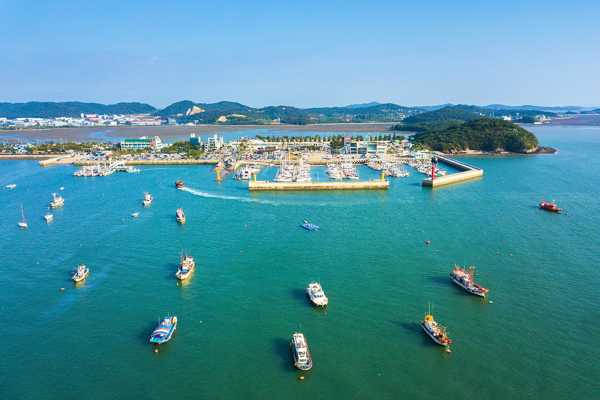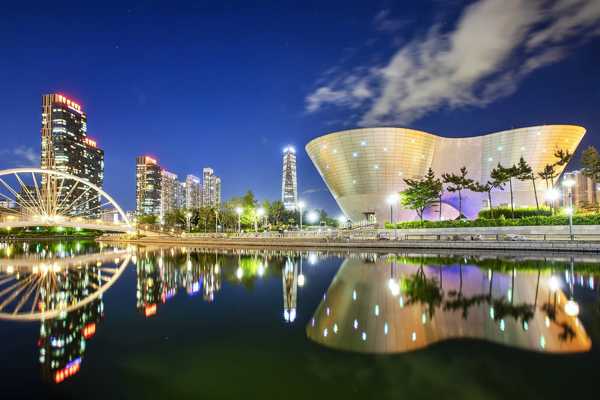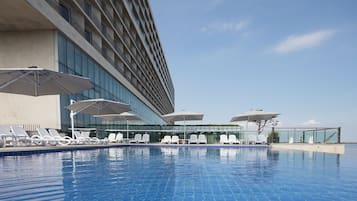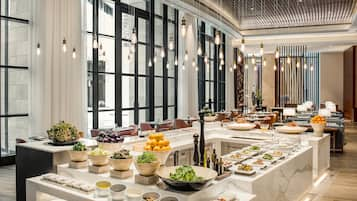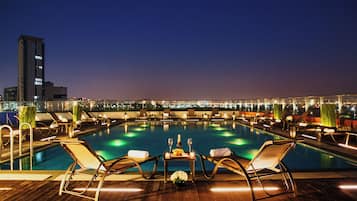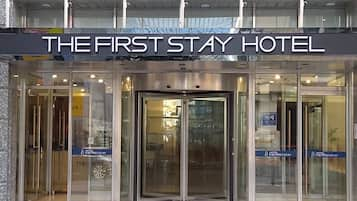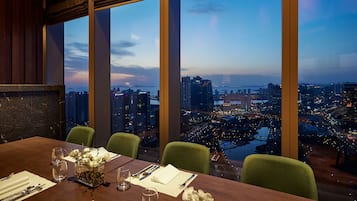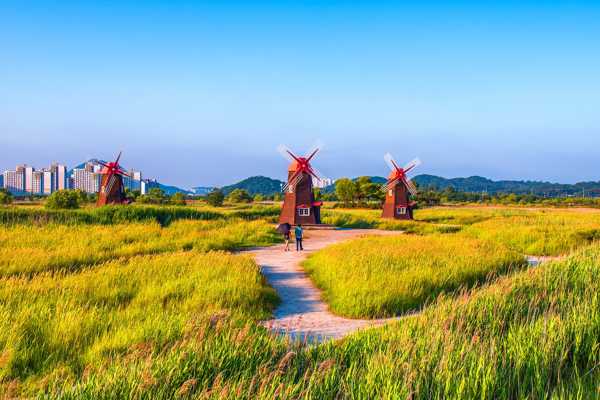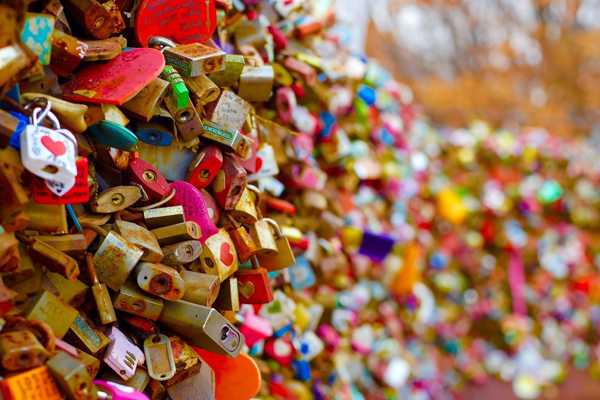In Incheon, a city with a long history of trade, markets have developed from ages ago. Meet different types of markets in the city, from historic markets where Chinese and Japanese merchants came and went since the opening of the port, to fish markets that bring fresh seafood from the coastal waters to the tables of locals, and to traditional markets that have coexisted with the community for decades.
Traditional markets are typically described as places where people easily become friendly with each other and time flows slowly, but with the emergence of online shopping platforms, these markets are also changing to survive. Visit some of these markets and find how they struggle to keep up with times and be reborn as modern shopping centres, improving hygiene through facility maintenance, securing competitiveness with same-day delivery services, and enhancing customers' convenience with instant parcel services, while also exploring the traditional side that the markets still retain.
- 1
Incheon Complex Fish Market
A market providing fresh seafood right from the sea

- Food
- Shoppers
Incheon Complex Fish Market, the largest seafood market in Korea, serves as the national centre of seafood trade, distributing seafood delivered directly from all parts of the country to the capital area on the same day, as well as supplying fresh seafood caught by Incheon fishermen from the coast of the West Sea. Divided into sections for fresh fish, live fish, dried seafood, salted seafood, shellfish, and frozen seafood, the market has established its reputation as a fish distribution market and a tourist destination with its huge size as a market for wholesale and retail traders.
Passing through the entrance, even before you are surprised by the sheer size of the market, you will find yourself walking in rows, swept along the endless tide of people. At the fresh fish section, you can buy plump seasonal seafood at a reasonable price, while at the dried and salted seafood sections, you can find a variety of seafood that you can keep and enjoy for a long period. Trying fresh raw fish dishes is something you shouldn't miss at a fish market. Your time will fly by while you look around the market, which is filled with seafood that is hard to find in urban supermarkets and the energetic shouts of vendors who tout passers-by.
Location: 37, Yeonanbudu-ro 33beon-gil, Jung-gu, Incheon, Republic of Korea
Open: Daily from 5 am to 9 pm
Phone: +82 (0)32-888-4242
Map - 2
Sorae Fish Market
A lively market filled with the scent of the sea

- Food
- Shoppers
Sorae Fish Market, close to Sorae Port and filled with the fresh scent of the sea, is a representative traditional market in the capital area crowded all year round with customers shopping for seasonal seafood. This market, located at the small port, once provided seafood to customers who reached it by narrow-gauge train that doesn't exist anymore. The market has now been transformed into a clean, modern shopping centre even equipped with a seawater purification system. It is also a good place to buy a gift for your acquaintances, as you can have your purchased items delivered by courier on the spot.
In spring, the market is overcrowded with customers who want to buy blue crabs that are in season. The market is the nation's famous distributor of blue crabs, so much so that Koreans naturally associate this market with blue crabs. The Sorae Port Festival has established itself as a representative local festival, attracting over a million tourists every year. The market is also famous for its salted and dried seafood sections, and on weekends, customers from all over the capital area flock to the market, filling the entire parking lot and all the tables of the nearby restaurants. As the market is adjacent to Sorae Railway Bridge and Jangdo Battery Site, it is good to take a short tour of these tourist spots after shopping.
Location: 12, Soraeyeok-ro, Namdong-gu, Incheon, Republic of Korea
Open: Daily from 7 am to 1 am
Phone: +82 (0)32-719-1522
Mapphoto by 웬디러비 (CC BY-SA 3.0) modified
- 3
Sinpo International Market
A popular gastroventure destination

- Food
- Shoppers
The predecessor of Sinpo International Market was a traditional market formed near foreign settlements during the port opening era. From a small market that served as a window through which foreign culture was introduced, Sinpo International Market developed into a general market that provides various food and daily necessities. Beginning as an international market close to the residential areas of the Chinese and Japanese at the time, the market is now more famous as the home to Incheon's representative eateries.
There is no doubt that the most representative of these restaurants is Sinpo Dakgangjeong. Located near the market entrance, it entices people with this sweet and sour chicken dish before they even start shopping. Sinpo Uri Mandu, which gained a nationwide reputation for dumplings, also started as a small eatery in this market. This restaurant, which the owner opened as his final attempt before giving up on life, has become a legendary success story that symbolizes this market. You can also find the nostalgic 60-year-old Sinpo Gwajajeom that serves traditional confectionary such as guribol and bamgwaja and gonggalppang shops. It would be best to forget about your diet when you visit this market.
Location: 11-5, Uhyeon-ro 49beon-gil, Jung-gu, Incheon, Republic of Korea
Open: Daily from 10 am to 9.30 pm
Phone: +82 (0)32-772-5997
Mapphoto by Jjw (CC BY-SA 4.0) modified
- 4
Ganghwa Folk Flea Market
A place to shop for fine local products

- Food
- Shoppers
Ganghwa Folk Flea Market, which succeeded the tradition of Ganghwajang, is a local traditional market formed by merchants who put up stalls around Ganghwa Market, which has been transformed into a shopping district. The main specialties of this market include hwamunseok (woven sedge mats), ginseng, and turnips. Ganghwado Island has a long history of ginseng cultivation, which started when farmers from Gaeseong, a region famous for ginseng, left their hometown and settled on the island during the Korean war. Meanwhile, some of the turnips produced in the island today are from the seeds planted by British Navy Lieutenant Corell invited as a military instructor for Tongjeyeong Hakdang (Korean Imperial Naval Academy) established here in 1892.
As the market is always crowded with tourists and locals, especially when the traditional 5-day market is open on the days that end in 2 and 7 every month, it is hard to find a parking space. However, if you want to experience the market's true character and various tasty local delicacies, it is recommended to visit it while the 5-day market is open. The market's official closing time is 8 pm, but as each store has different operating hours and many of them close at 6 pm, it is better to hurry.
Location: 17-9, Jungang-ro, Ganghwa-eup, Ganghwa-gun, Incheon, Republic of Korea
Open: Daily from 8 am to 10 pm (closed on first and third Mondays of the month)
Phone: +82 (0)32-934-1318
Map - 5
Singi Market
A local fixture serving a variety of delicacies

- Food
- Shoppers
Singi Market, which has about 120 stores in an area of 3,300 square metres, is a space that provides a variety of food and attractions not only for residents of Juan-dong but also those of the entire Michuhol-gu. Although it is an old market opened in 1983, it has been transformed into a clean and convenient shopping space where people can shop pleasantly even in bad weather through the installation of convenience facilities comparable to large marts, such as an arched roof and unmanned fire detectors. The extension of the parking lot in 2003 also added to its convenience. Singitongbo, the currency used only in this market, provides a fun and unique shopping experience for customers, especially foreigners visiting the market.
Like any other traditional market, the market has many popular restaurants with locals. Halmae Buchim, which sells buchimgae (Korean pancakes), is a paradise for those who want to have this dish, which is usually eaten on traditional holidays, even on ordinary days. Gwangmyeong Hongdukkae Sonkalguksu also attracts passers-by with tasty noodles in hot savoury anchovy broth. The hearty serving size is something that you can find only in a traditional market. Shops providing banchan (side dishes) that have long been served on the tables of locals also await customers with various tastes of dishes. You can choose from a variety of these dishes that would suit your palate.
Location: 547, Michuhol-daero, Michuhol-gu, Incheon, Republic of Korea
Open: Daily from 11 am to 10 pm
Phone: +82 (0)32-865-5424
Map - 6
Daeryong Market
A historic market that witnessed the sorrows of refugees

- Food
- Shoppers
Daeryong Market is located on Gyodongdo, an island inhabited by refugees who settled down there during the war period and located over Gyodongdaegyo Bridge that you can cross only after passing an inspection at a Marine Corps post on Ganghwado. During the Korean War, people who had fled from Yeonbaek in Hwanghae Province to this island could not return to their hometowns as the demarcation line was drawn along the estuary of the Hangang River. They then started trading goods to make a living, which was the beginning of this market. This story was featured in several TV shows and resonated with many people, and with the recent newtro trend, the market has become a rising tourist destination within the capital area.
Taste the famous gangajitteok at Cheongchun Bravo after waiting in line and then walk along the cosy alleys. The old-fashioned Gyodong Barbershop and Gyodong Theatre will make you feel as if you've travelled back in time. After taking a photo of every corner of this hidden gem-like place, go out to the main road and buy cute souvenirs at the farmers' market, which will make a perfect ending to a fun-filled day.
Location: 35, Gyodongnam-ro, Gyodong-myeon, Ganghwa-gun, Incheon, Republic of Korea
Open: Daily from 8 am to 10 pm
Map - 7
Incheon Moraenae Market
A pursuit of both novelty and tradition

- Food
- Shoppers
Incheon Moraenae Market, located in Guwol-dong, a hot place in downtown Incheon, has set a future model for traditional markets through facility modernization and merchant training since its establishment in 1982. The market has continuously tried out changes, holding various events such as Yahan Market, Incheon’s first night market that pioneered night tourism using lively traditional markets, and Nomaek Festival where draft beer and nogari (dried pollack) are served at affordable prices in the hot summer.
This market, which is larger than any other conventional traditional market, has various famous restaurants such as Minyeong Hwareo Gongjang, 032 Dakgangjeong, and Sexy Tteokbokki, and shops serving a variety of food including rice cakes, seafood, fruit, and bread and confectionary, as well as diverse attractions. Connected to Moraenae Market Station on Incheon Subway Line 2, the market can be accessed using public transportation. Take a leisurely look around the market without worrying about parking and find the traces of time in this market that has breathed with the residents of Guwol-dong for over four decades.
Location: 42-8, Hogupo-ro 810beon-gil, Namdong-gu, Incheon, Republic of Korea
Open: Daily from 9 am to 10 pm
Phone: +82 (0)32-471-1427
Map - 8
Bupyeong Market
A mammoth-class market selling all things you need

- Food
- Shoppers
Started as a street stall area called Bupyeong Public Market in 1958, Bupyeong Market boasts an overwhelmingly enormous size, connecting tradition and modernity in the middle of the city. Bupyeong Market also collectively refers to various markets around the area, namely Bupyeong Station Underground Shopping Mall that mainly handles clothing and IT equipment, Bupyeong Kkang Market specialized in fruits and vegetables and marine products, and Bupyeong General Market where agricultural products, dried seafood, and miscellaneous goods are traded. Bupyeong market, which is about the size of two general subway stations, provides a vast array of goods provided by numerous stores in it.
In particular, what attracts most tourists to this market is the famous eateries that serve local food. As a city with a Chinatown, Incheon has many Chinese restaurants. At Junhwamyeonsik, you can taste the essence of hand-made Chinese twisted donuts at affordable prices, while Bokdaengine Eomuk attract shoppers with a special fish cake stuffed with mozzarella and cheddar cheese. If you're looking for lower prices and friendlier interactions than what you find at department stores and large marts and want to see the quality of goods for yourself (which is not available when you shop online), visit Bupyeong Market, which lives up to its reputation as a general market.
Location: 38-3, Buheung-ro 316beon-gil, Bupyeong-gu, Incheon, Republic of Korea
Open: Daily from noon to 8 pm
Phone: +82 (0)32-516-0655
Mapphoto by Steve Butterfield (CC BY-SA 2.0) modified
- 9
Gajwa Market
A friendly place with a human touch
- Food
- Shoppers
Formed in the early 1970s, Gajwa Market has existed for over 40 years as a friendly shopping space consisting of about 140 stores that provide reasonable prices to locals. From vegetables and fruits to industrial products and fashion items, all the things that residents of Seo-gu look for are carefully displayed in each store. Interestingly, you can find a Kangaroo-shaped character in every corner of the market, which is one of the attempts to create a family-friendly space for customers shopping with their children.
At Toony Bean, a comic book café located in the youth mall on the basement level, you can read comic books and experience VR content, and enjoy coffee and bread at affordable prices. Chef's Gukbap is a must-visit restaurant if you crave hot pork and rice soup, and Bonmal Gamjatang is a take-out restaurant famous for its clean, odourless broth made by simmering premium pork neck bones for more than four hours. Explore the market in search of something common but hard to find in your neighbourhood.
Location: 18-19, Janggogae-ro 337beon-gil, Seo-gu, Incheon, Republic of Korea
Open: Daily from 9 am to 8.30 pm
Phone: +82 (0)32-584-5006
Map - 10
Oknyeon Market
A small but all-round market
- Food
- Shoppers
Ongnyeon Market, which opened in 1996, is a relatively small market located between apartment complexes, but having various types of shops, it has become a main shopping area for residents of Yeonsu-gu. As the market is specialized in food, there are many distinctive small shops serving different kinds of food, and some of them provide local delicacies that will wake up your appetite in one bite at affordable prices.
The highlight of your gourmet trip this market will be raw yellow tail dishes from Hunsusan, a take-out restaurant. Yellow tail is in season by the time the cold wind starts blowing in. The fish becomes plump and creamy enough to satisfy your palate in December and January, as it stores fat during the winter. Hunsusan, also providing special cuts of the fish at affordable prices, has been widely known across the nation purely by word of mouth and is attracting many people to the market. Mayak Chicken, Tteokdonald's, and Jangsu Sonmandu are also popular with foodies looking for tasty yet affordable meals at traditional markets. As the market has no dedicated parking lot, don't forget that you need to use a paid on-road parking lot.
Location: 53, Hannaru-ro 79beon-gil, Yeonsu-gu, Incheon, Republic of Korea
Open: Daily from 8 am to 9 pm
Phone: +82 (0)32-831-8640
Map

